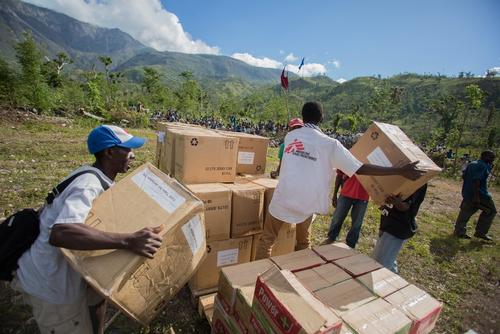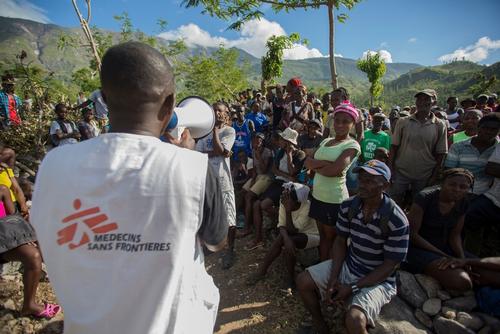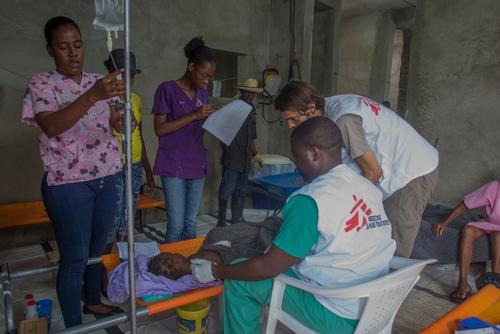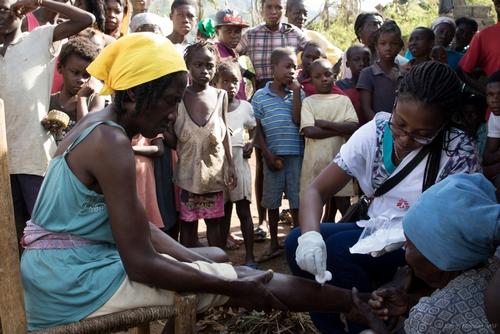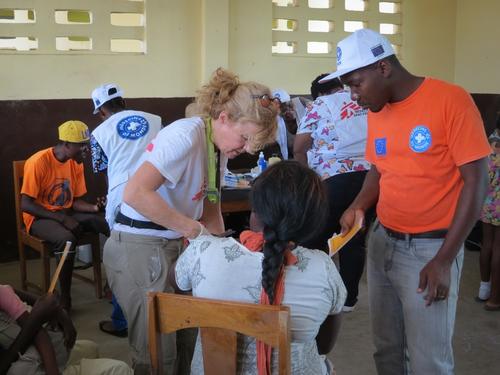After providing urgent medical care, Médecins Sans Frontières (MSF) launches a building materials distribution campaign to benefit 10,000 families living in the remote mountains of Sud-Ouest, the island region most severely affected by Hurricane Matthew.
MSF has launched a massive distribution of building materials, hygiene kits, water storage equipment and purification tablets, blankets and energy biscuits in the most remote mountainous region of Sud-Ouest, in Haiti. Each of the 9,530 beneficiary families will also receive a set of 10 corrugated metal sheets, enough to rebuild a 12m2 roof and provide shelter.
"In remote areas of the mountains, people were forced to hastily rebuild by salvaging materials that had been blown around by the wind, often broken and full of holes. The poor construction quality of the buildings does not provide adequate shelter from the elements, especially heavy rains, and this can have direct consequences on their health," says Lily Caldwell, MSF's emergency team coordinator.
Arranging distribution logistics, which received support from the World Food Programme, is a huge challenge, given the difficulty of reaching these areas, where there are often no roads and security is lacking. "Bad weather often limits our window of activity – sometimes even grounding the helicopters, which are our only means of reaching these remote areas. These long delays create a lot of frustration, so our field teams have to spend a great deal of time explaining our actions before we can proceed and ensure that distribution occurs under the right conditions, all of which leads to even further delays!" states Lily Caldwell.
Once assessments are complete, MSF provides support
"What a joy it is to receive these items from MSF. It's like getting a bit of fresh water in the region after days of nothing to eat or drink. We do need more, but we are really grateful for this assistance," says Jean Marc, a member of the Chardonnières community. MSF has relied on a partnership with community members to ensure the success of the initiative. It has over 250 national and 39 international staff still active in the post-Matthew response, in addition to the regular response teams working in six health facilities in the country.
"Donations are going well. In the presence of MSF staff, the beneficiary collects the donation for his/her family [an average of 7 people] from a community representative who previously accepted the items at the time they were delivered," explains François Giddey, the MSF field distribution coordinator.
In the aftermath of Hurricane Matthew, MSF provided emergency response in the departments of Grande Anse, Sud and Nippes. In Nord, Artibonite and Ouest, support was also provided to other hospitals, to allow them to better meet their needs. Over 830 injured people were treated by MSF during the hurricane, the medical needs of 6,341 people were attended to, 458 cholera patients were treated, 26 water outlets were rehabilitated and so far 10,092,500 litres of clean water have been provided by tanker.
At the same time, in support of the Ministry of Health, we provided cholera vaccinations to approximately 13,800 people in the most affected and hardest-to-reach areas of Sud and in the town of Coteaux. Throughout 2017, MSF expects to maintain a regular presence in the Port-à-Piment community centre to reinforce the healthcare services provided there.
In 2017, MSF operates six hospitals in the metropolitan area of Port-au-Prince: the Drouillard hospital burn unit, the Martissant 25 emergency centre, the Nap Kenbe emergency surgical hospital, the CRUO referral centre for obstetrical emergencies, the Pran Men'm clinic for survivors of sexual and gender-based violence, as well as the emergency and cholera response unit, which can be operational within hours. MSF also supports the Ministry of Health through the Diquini centre for cholera patients and has been active in Haiti on a regular basis since 1991.



